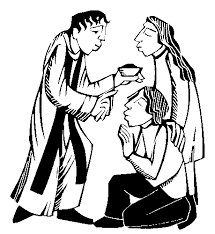Yet even now, says the Lord, return to me with all your heart, with fasting, with weeping, and with mourning; rend your hearts and not your clothing. Return to the Lord, your God, for he is gracious and merciful, slow to anger, and abounding in steadfast love, and relents from punishing. (Joel 2:12-13)
Many years ago, I taught in the Theatre Arts
department of a small community college in California. I shared my office with a
lanky, philosophically inclined Brit named David who reminded me for all the
world of a skinny Ringo Starr[i].
David had decorated his part of our office with pictures from an old calendar—atmospheric
black and white photographs with poignant sayings. I only remember one of the
pictures. It was the photograph of an old man sitting in shadows on a porch.
The caption read, “I no longer care if anyone truly loves me. I will settle for
being treated well.”
Isn’t that the truth? The older we get, the
less concerned we are with the opinions of others. There’s something liberating
about old age. Once we’re retired, we’ve achieved all the status we’re going to
achieve. If our hair gets thin and our flesh sags, we’ve got to decide our
looks don’t matter anymore. We’re not in competition any longer—even though the
gods of this world are constantly trying to tell us we must stand out from
the rest of the pack. At some point we reach the place where we’ve made peace
with our own ordinariness.
In her commentary on the Ash Wednesday gospel (Matthew
6:1-6, 16-21) on the Working Preacher website, Pacific Lutheran Seminary
professor Alicia Vargas writes how Jesus is teaching us in these verses to
focus our piety on our relationship with God and not on what the world will
think of us. If we are generous, prayerful, and sacrificial (remember that fasting
was not about going on a diet—it was about denying oneself so as to have
resources to donate to the more needy), we don’t do it to be praised. It’s all
between us and God. Dr. Vargas notes the passage begins with a warning: if we
do what we do to be admired or to show someone up, we get no reward from our
Father.
But here’s where I see a dichotomy. I agree our
motive should be to do what is right, denying the values of this world, and storing
up our treasure in heaven. At the same time, isn’t doing what is right almost
always about our relationship with others? Aren’t we commanded to love
God and love neighbor? Although this scripture—a passage we read every year on
Ash Wednesday—tells us not to disfigure our faces, we purposely do so.
Why?
We
do it to be witnesses to one another.
The
Late Christian writer Rachel Held Evans, in her beautiful book Searching for
Sunday[ii],
tells of how a radio interviewer once asked her why, since she had so many
doubts and questions about her faith, she could remain a Christian. Her answer
was, “I’m a Christian because Christianity names and addresses sin. It
acknowledges the reality that the evil we observe in the world is also present
within ourselves. It tells the truth about the human condition—that we’re not
okay.[iii]”
The
cross of ashes on our foreheads on Ash Wednesday is a witness to the truth that
we are sinners, we hurt and are hurt, and some day we will die. We come
before one another on this sacred day and get these ugly truths out in the
open. And somehow, once the truth of who we are and what we are is out there,
it doesn’t seem quite so shameful anymore.
The
liturgical formula for this ancient rite comes from Genesis 3:19
“By the sweat of your face shall
you eat bread until you return to the ground, for out of it you were taken; you
are dust, and to dust you shall return.”
I
always try to remember that in the story told in Genesis, God had banished the
man and his wife from Paradise and had condemned them to a life of sweat and
toil. Yet God did not make good on the threat God had issued about eating from
the forbidden tree[iv]:
“…but of the tree of the knowledge
of good and evil you shall not eat, for in the day that you eat of it you shall
die.”
Instead,
God commuted the death sentence and gave disobedient humanity another chance to
learn obedience and gratitude and love—treasures stored in heaven with no promise
of earthly acclaim or reward.
Let
us all begin this season of Lent in humility, aware of our common vulnerability
and of the graciousness of God.
[i]
David Herman was a gifted teacher and theatre director. Several years my senior
in age, he was the closest thing I’ve ever had to a “big brother.” He was
always very patient and kind with his young colleague. He passed away in 2006.
I think of him often.
[ii] Evans,
Rachel Held: Searching for Sunday: Loving Leaving, and Finding the Church
(Nashville, TN, Nelson Books, 2015). It’s a good book. You should check it out!
[iii]
Ibid. p. 67.
[iv]
Genesis 2:17

No comments:
Post a Comment